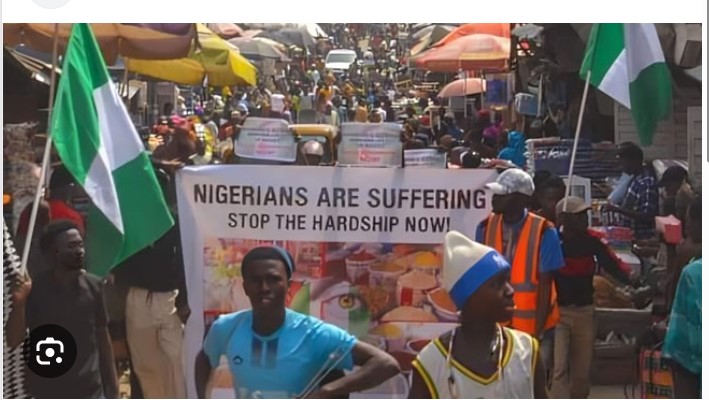A teacher in Kano, northern Nigeria makes a three-hour daily commute to school on foot, no longer able to pay for a ride in a tuktuk rickshaw. A civil servant in Ilorin, central Nigeria, can no longer afford rice for her three children, switching to gaari, made from processed cassava, a dish usually consumed by low-income Nigerians. Many are turning to tasteless hard-to-cook broken, dirty and tough rice grains that millers normally reject after processing or sell to farmers as fish food.
On the 25th of February 2023 Nigerians went to the polls to elect President Buhari’s successor. There were high hopes; the atmosphere was charged with energy as Nigerian youths were galvanised by Peter Obi, the candidate who offered hope of a new era. Sadly, violence and intimidation impacted voter turnout, compounded by fuel and cash shortages as well as logistical shortcomings and technology failures from the Independent National Electoral Commission (INEC), the institution charged with overseeing the presidential elections process prompting accusations of electoral malfeasance. A historically low voter turnout of just 27 per cent, combined with unprecedented division of votes between four leading candidates means that President Tinubu’s mandate emanates from less than 10 per cent of Nigeria’s electorate. A legal challenge failed to overturn President Bola Tinubu’s disputed election victory.
A year since those elections, the nation is in the grips of its worst economic crises in years provoking widespread outrage. Convergence of global pressures, President Tinubu’s cancellation of the nation’s fuel subsidy plus the devaluation of the national currency, the naira, have added to inflation. Prices in Nigeria are increasing at their fastest rate for nearly 30 years.
How did we come to this? Three policy missteps:
- Fuel subsidy withdrawal: The decades-long subsidy had kept fuel prices cheap but had become increasingly expensive. Inadequate and dysfunctional refining capacity subjects Africa’s largest oil producer to import over 90% of its fuel, exposing its economy to fluctuating exchange rates and international oil prices. Subsidies cost Nigeria $350 million in 2020, when prices were low. In 2022, it paid $10 billion!
The president’s actions, which have been devastating to the livelihoods of many Nigerians, were considered necessary to address the nation’s ailing economy and were initially greeted with enthusiasm by investors and international backers. Short-term pain for long-term gain was one description proffered by an economist. A nation where, according to the World Bank, an estimated 84 million live below the poverty line, making it the world’s second-largest poor population after India, was unprepared for the speed of reform. Headline inflation is at 29.9%, while staple foods like rice have doubled and commodities have tripled. The cost-of-living crisis and economic hardship have prompted protests across the country.
2. Devaluation of the naira: Plummeting local currency, the naira, has compounded the negative impact of government reforms. Many businesses rely on the US dollar to import finished goods or raw materials used in local production, generating demand for the dollar. Years of foreign exchange controls created enormous pent-up dollar demand at a time when overseas investment and crude oil exports have declined. The Central Bank of Nigeria (CBN) has admitted that its 2015 ban on certain companies accessing dollars pushed importers to the unofficial market and contributed to a ‘surplus demand for foreign exchange’.
An attempt to rescue the beleaguered economy and attract foreign investment by unifying exchange rates and allowing the naira to float more freely against the dollar has failed to produce the desired effect. Instead, it sent the currency into a nosedive leading to extremely high dollar rates and forcing the naira to an all-time low.
3. Dependence on foreign investors: A nation plagued with insecurity is unlikely to attract foreign investors. The president’s financial reforms were meant to enable market forces rather than the CBN to determine the exchange rate and boost inflows of money to help stabilize an economy battered by surging inflation and high unemployment rate. Unfortunately, this move has sent the currency into free fall, while investors are yet to be persuaded by the reforms. Lack of confidence in the naira, policy uncertainty and lingering security issues converge to drive up inflation and cost of imports.
Tinubu inherited a record amount of government debt, endemic corruption, high unemployment, rampant insecurity, power shortages and declining oil production- its main export- that have contributed to years of economic retardation. To quote one analyst, ‘while Buhari kicked the can down the road, Tinubu has ripped off the band aid’!
Anyone can remove anything, but the most important thing is the implementation of even the most necessary actions. The ‘how’ matters; citizen-centred leadership does not subordinate the important to the urgent. External forces and the pressure of the ballot box often entices politicians to subordinate the important to the urgent; to paraphrase James Freeman Clarke ‘A politician thinks of the next election; a leader thinks of the next generation.’ Nigerians are ready to sacrifice to improve the lives of future generations and feel that if subsidy removal leads to improved education, health system, transport etc. then it would all be worth it in the end. The necessity of these reforms is not in question; it is the manner of their execution that has left millions of Nigerians reeling. The fast pace of these reforms without adequate protection for the most vulnerable has created an unjust, unfair and overwhelming burden amid multiple crises. Reports of seven deaths in Lagos from a deadly stampede for cheap rice last weekend underscores the gravity of the situation.
All leaders, serving and aspiring, must understand their unassailable duty to serve and put the welfare of their people first. Reforms and changes must be introduced tactfully and humanely.

